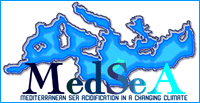MedSeA, new European project led by ICTA

21/02/2011
The MedSeA project will carry out prospections of chemical, climatic and biological changes taking place in the Mediterranean Sea due to increases in carbon dioxide (CO2). Researchers will be paying special attention to the impact of acidification on marine organisms, and will be studying the social and economic consequences of these changes. Research studies will be interdisciplinary, with the participation of chemists, biologists, ecologists and economists, and will serve to gather data and new assessments on how Mediterranean marine ecosystems respond to acidification, with the aim of mapping the most vulnerable areas. Results will go towards improving current oceanographic models and will help to develop regional political strategies to mitigate effects.
The main project directives were debated and established on 22 and 23 February. On 24 February the first meeting was held between scientists and a reference user group, made up of political and industrial experts, and representatives of Mediterranean NGOs (MRUG), responsible for informing and assessing European governing bodies on the results of the project.
Participating in the MedSeA project, coordinated by ICTA's researcher Patrizia Ziveri, are 86 researchers from 16 institutions based in ten different countries, including three from the International Cooperation Partner Countries: Morocco, Tunisia and Egypt. The total budget for the project, which will last three years, is of six million euros, of which 3.5 million are funded by the European Union.